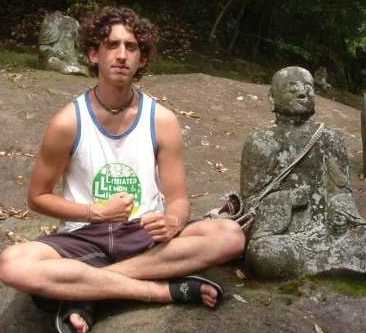Japan IO Quaint quarries on the way to Tensui
Quaint quarries on the way to Tensui
The cliché goes that Japan is a country of contradictions, a melting pot of East and West where traditions collide in Zenlike harmony. Native and foreign elements are perceived as complementary, and adjectives for the resulting combination may hover around anything from fascinating to anachronistic. Many will be ready to point out the dissonance of old and new, the cunning alloy of Western wit and Eastern wile. Japan, they say, still retains its Asian soul amidst cold industrial technology. Yet, despite its cultural schizophrenia—or perhaps because of it—Japan is not so much an incongruous country as it is a place ruled by binary opposition.
Japan does retain many traditions and faux pieces of culture, if not for the sake of authenticity, at least to cling to a romantic image of a "pure" Japan that never was. Many famous Japanese cultural symbols are political creations of the late Edo (Tokugawa) and early Meiji periods, roughly between 1850-1900 and analogous to the height of Western imperialism. They are based less on real tradition than a bid to establish a national identity to secure national unity.
It was during this period that Kabuki theatre, once a persecuted and vulgar form of art, was raised to highbrow status as delineative of the ‘Japanese spirit’ - this despite the rebelliousness and social critique underlying many Kabuki themes. The newly acquired state religion, State Shinto, managed to take local animistic rites and put them in a national scope, all the while creating new rituals to exacerbate the myth of Japan as a monolithic entity. Ancient books, such as the Kojiki (a collection of mythology from circa 1200 AD and roughly a Japanese equivalent to Homer’s Illyad), were used as a base for the newfangled national faith. Even though the country as a unified whole is a relatively recent idea, the Meiji oligarchs endeavoured to give Japan millenary legitimacy through a mishmash of cultural and religious forms, and they exist until these days as national symbols.
The above is not always easy to reconcile with the modern highways, mobile phones and capitalist consumerism that describe Japan in the present. In turn, nationalist sentiments and institutionalised xenophobia have further helped to forge a widespread concept of cultural absolutes, where things are either Japanese or foreign in nature.
Nativism is not a new phenomenon in Japan, and its society reveals a deep nationwide concern with cultural purity. It comes as no surprise that one of the most favoured adjectives by many Japanese–especially those who speak English—is “Japanese,” as though the word itself carried a significant descriptive weight. It can be seen, read and heard everywhere, from tourist pamphlets evoking that elusive ‘spirit of Japaneseness’, Yamato damashii, to pop music lyrics (such as a recent hit titled “Japanese girl”) or endless conversations about ‘Japanese’ tea and ‘Japanese’ cherry blossoms.
Since trying to define what exactly constitutes being Japanese is tricky, it is easier to establish what is not Japanese instead. Thus cherry blossoms and green tea belong to Japan, because highways, mobile phones and capitalism do not. If the latter are of higher quality than in the West, it is only because they are imbued with abstractions, such as the Yamato damashii.
Yet all these arguments start sounding dubious if we consider that most cultural legacies are almost never engendered through singularities, but a buildup of numerous traditions, generally from different places. They borrow from one another, in turn giving form to separate expressions of folklore. Just as Zen Buddhism –a defining theme in many traditional Japanese art forms- is founded in traditions from China and India, modern-day Japanese capitalism borrows heavily from North American and European models. Even cherry blossoms are native to several countries. The concept of cultural absolutes, then, vanishes in between the grayscale shades of critical debate.
Due to reasons both historical as they are political, however, and an educational system lacking in discussion, focused instead on correct/incorrect answers, a large number of Japanese end up perceiving their country not as a mere state-governed physical location, but rather a state of mind. Japan is as much a name as it is a feeling, pride conjoined with deep nostalgia for the old furusato (village), that mythical commonplace of virginal kimono clad maidens performing tea ceremonies for stern samurais. Binary logic has, in short, made Japan a stereotype of itself. And while the preservation of cultural legacy is a legitimate endeavour, history has shown how dangerous equating concepts of nation, race and culture can be.
Japan is indeed a melting pot of contradictions, but only because of the antipodean struggle to separate the native from the foreign, even when these boundaries are oftentimes imaginary. It might not provide seamless harmony, but certainly paves the way for more similar clichés.




